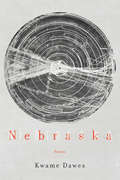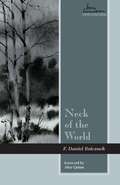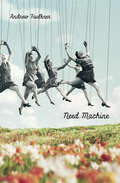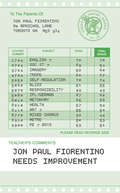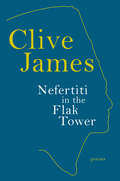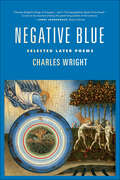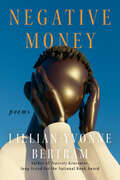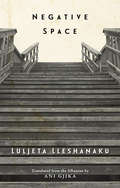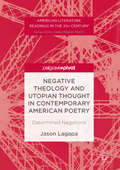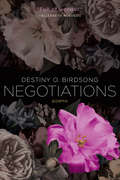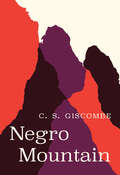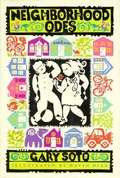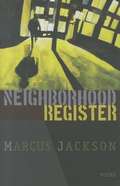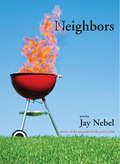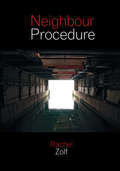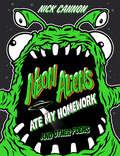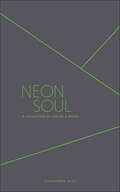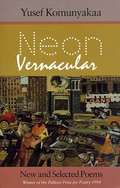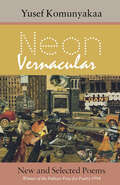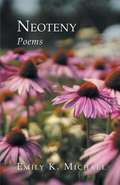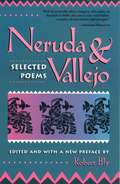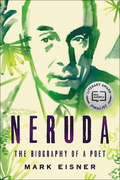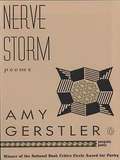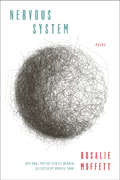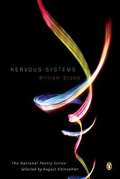- Table View
- List View
Nebraska: Poems
by Kwame DawesKwame Dawes is not a native Nebraskan. Born in Ghana, he later moved to Jamaica, where he spent most of his childhood and early adulthood. In 1992 he relocated to the United States and eventually found himself an American living in Lincoln, Nebraska. In Nebraska, this beautiful and evocative collection of poems, Dawes explores a theme constant in his work—the intersection of memory, home, and artistic invention. The poems, set against the backdrop of Nebraska’s discrete cycle of seasons, are meditative even as they search for a sense of place in a new landscape. While he shovels snow or walks in the bitter cold to his car, he is engulfed with memories of Kingston, yet when he travels, he finds himself longing for the open space of the plains and the first snowfall. With a strong sense of place and haunting memories, Dawes grapples with life in Nebraska as a transplant.
Neck of the World (Swenson Poetry Award #11)
by F. Daniel RzicznekNeck of the World is the eleventh volume in the prestigious May Swenson Poetry Award series. In it, Daniel Rzicznek offers poems that, in quick angular language, capture the natural world and at the same time extend it into a surreal vision, sometimes dream-like, sometimes dark. Alice Quinn, judge for the 2007 Swenson Award, says this of Rzicznek’s work: “Throughout, the language pulsates, always vigorous, by turns knotty and crystalline. . . . In Neck of the World, we have a poet with a striking new vision--challenging, rewarding, and bold."
Need Machine
by Andrew FaulknerNeed Machine clamours through the brain like an unruly marching band. Both caustic and thoughtful, these poems offer a topography of modern life writ large in twitchy, neon splendor, in a voice as sure as a surgeon and as trustworthy as a rumour. Honest, irreverent and sharply indifferent, this book will hogtie you with awe.
Needs Improvement
by Jon Paul FiorentinoWhether misreading sixth-grade pedagogical materials or offering visual schematics for reading Michel Foucault and Judith Butler, Jon Paul Fiorentino's sixth poetry collection asks us to reconsider our engagement with received information -- but does so with a wink during detention.
Nefertiti in the Flak Tower: Poems
by Clive James"Clive James is more or less the only living poet who manages to be both entertaining and moving."--Edward Mendelson Clive James's renown as an internationally celebrated poet continues to expand, and there is no stronger evidence for this than Nefertiti in the Flak Tower, a collection "steeped in the lessons of Philip Larkin and W.B. Yeats" (London Times). Here, his polymathic learning and technical virtuosity are worn more lightly than ever; the effect is to produce a deep sense of trust into which the reader gratefully sinks, knowing they are in the presence of a master. The most obvious token of that mastery is the book's breathtaking range of theme: there are moving elegies, a meditation on the later Yeats, a Hollywood Iliad, and odes to rare orchids, wartime typewriters, and sharks--as well as a poem on the fate of Queen Nefertiti in Nazi Germany. Despite the dizzying variety, James's poetic intention becomes increasingly clear: what marks this new collection is his intensified concentration on the individual poem as a self-contained universe. Poetry is a practice he compares (in "Numismatics") to striking new coin, and Nefertiti in the Flak Tower is a treasure chest of one-off marvels, with each poem a twin-sided, perfect human balance of the unashamedly joyous and the deadly serious, "whose play of light pays tribute to the dark."
Negative Blue: Selected Later Poems
by Charles WrightNegative Blue is the culmination of the cycle that won Wright the Pulitzer Prize and National Book Critics Circle Award.Time will append us like suit coats left out overnightOn a deck chair, loose change dead weight in the right pocket,Silk handkerchief limp with dew, sleeves in a slow dance with the wind.And love will kill us--Love, and the winds from under the earth that grind us to grain-out.--from "Still Life with Spring and Time to Burn"When Charles Wright published Appalachia in 1998, it marked the completion of a nine-volume project, of which James Longenbach wrote in the Boston Review, "Charles Wright's trilogy of trilogies--call it 'The Appalachian Book of the Dead'--is sure to be counted among the great long poems of the century."The first two of those trilogies were collected in Country Music (1982) and The World of the Ten Thousand Things (1990). Here Wright adds to his third trilogy (Chickamauga [1995], Black Zodiac [1997], and Appalachia [1998]) a section of new poems that suggest new directions in the work of this sensuous, spirit-haunted poet.
Negative Money
by Lillian-Yvonne BertramFrom a National Book Award nominated poet, this collection is about a life lived in the red, on the edges of great lack and great abundance, of financial and emotional marginsNegative Money follows a speaker continually coming of age while probing the binary thresholds of racial and gender identity, violence and safety, security and precarity, love and loneliness.For readers of Readers Claudia Rankine, Torrey Peters, Ocean Vuong, and Jericho Brown, NBA nominated Lillian-Yvonne Bertrams&’s poems are innovative, conceptually thoughtful work. Through experimentation and muscular lyricism, Bertram maintains a style that observes a speaker&’s attempt to understand and exert multiple identities within the binary confines of race and gender.Playing and gliding from acrostics to sonnets to maps, these compassionate, cerebral, and irreverent poems plainly recognize the larger and potentially escapable oppressive systems that dominate all of our lives by narrating the exhaustion that comes from living under constraining systems of relentless extraction, systems whose powers fracture all attempts at genuine love and intimacy.
Negative Space
by Luljeta Lleshanaku Ani GjikaLleshanaku’s poems are “full of objects and souls, transformed and given wings in Chagall-like metaphor” (Sasha Dugdale, Poetry Nation Review) “Language arrived fragmentary / split in syllables / spasmodic / like code in times of war,” writes Luljeta Lleshanaku in the title poem to her powerful new collection Negative Space. In these lines, personal biography disperses into the history of an entire generation that grew up under the oppressive dictatorship of the poet’s native Albania. For Lleshanaku, the “unsaid, gestures” make up the negative space that “gives form to the woods / and to the mad woman—the silhouette of goddess Athena / wearing a pair of flip-flops / and an owl on top of a shoulder.” It is the negative space “that sketched my onomatopoeic profile / of body and shadow in an accidental encounter.” Lleshanaku instills ordinary objects and places—gloves, used books, acupuncture needles, small-town train stations—with subtle humor and profound insight, as a child discovering a world in a grain of sand.
Negative Theology and Utopian Thought in Contemporary American Poetry
by Jason LagapaThis book explores the utopian imagination in contemporary American poetry and the ways in which experimental poets formulate a utopian poetics by adopting the rhetorical principles of negative theology, which proposes using negative statements as a means of attesting to the superior, unrepresentable being of God. With individual chapters on works by such poets as Susan Howe, Nathaniel Mackey, Charles Bernstein, and Alice Notley, this book illustrates how a strategy of negation similarly proves optimal for depicting the subject of utopia in literary works. Negative Theology and Utopian Thought in Contemporary American Poetry: Determined Negations contends that negative statements in experimental poetry illustrate the potential for utopian social change, not by portraying an ideal world itself but by revealing the very challenge of representing utopia directly.
Negotiations
by Destiny O. BirdsongWhat makes a self? In her remarkable debut collection of poems, Destiny O. Birdsong writes fearlessly towards this question. Laced with ratchetry, yet hungering for its own respectability, Negotiations is about what it means to live in this America, about Cardi B and top-tier journal publications, about autoimmune disease and the speaker’s intense hunger for her own body—a surprise of self-love in the aftermath of both assault and diagnosis. It’s a series of love letters to black women, who are often singled out for abuse and assault, silencing and tokenism, fetishization and cultural appropriation in ways that throw the rock, then hide the hand. It is a book about tenderness and an indictment of people and systems that attempt to narrow black women’s lives, their power. But it is also an examination of complicity—both a narrative and a black box warning for a particular kind of self-healing that requires recognizing culpability when and where it exists.
Negro Mountain (Phoenix Poets)
by C. S. GiscombeA cross-genre poetry collection that troubles the idea of poetic voice while considering history, biology, the shamanistic, and the shapes of racial memory. In the final section of Negro Mountain, C. S. Giscombe writes, “Negro Mountain—the summit of which is the highest point in Pennsylvania—is a default, a way among others to think about the Commonwealth.” Named for an “incident” in which a Black man was killed while fighting on the side of white enslavers against Indigenous peoples in the eighteenth century, this mountain has a shadow presence throughout this collection; it appears, often indirectly, in accounts of visions, reimaginings of geography, testimonies about the “natural” world, and speculations and observations about race, sexuality, and monstrosity. These poems address location, but Giscombe—who worked for ten years in central Pennsylvania—understands location to be a practice, the continual “action of situating.” The book weaves through the ranges of thinking that poetic voice itself might trouble. Addressing a gallery of figures, Giscombe probes their impurities and ambivalences as a way of examining what languages “count” or “don’t count” as poetry. Here, he finds that the idea of poetry is visionary, but also investigatory and exploratory.
Neighborhood Odes: Poems
by Gary Soto David DiazFrom family pictures to pinatas, from the gato with a meow like a rusty latch to Fourth of July fireworks, the poet celebrates the startling and often overlooked moments that define childhood. Affectionate without being overly sentimental, the collection provides a good introduction to contemporary poetry as well as a fine homage to a Chicano community. --Publishers Weekly
Neighborhood Register: Poems
by Marcus Jackson"A poet whose voice and message we trust. . . a singular and significant voice. You will not forget this neighborhood, or this poet. " from the foreword by Toi Derricotte From the twilight towns of the Rust Belt to the vivid inlets of New York City, Neighborhood Register is a ledger of the people, scenes, and sectors from which hidden music and meaning unearth. The collection evokes the beauties and difficulties within multi-racial families, the value of vernacular, and the unexpected resonances of common objects. "In his fine first collection, Jackson lyrically knits together time, memory, human desires and obligations and invites the kind reader to dance along to his bright measures, which sometimes resemble the life of a young poet, deeply enmeshed in the world, and sometimes reflect like a mirror. " - Cornelius Eady
Neighbors
by Jay NebelNeighbors is a book of lyric narratives about the men and women who live and work next to us, the people standing in line at the DMV or buying milk and bread at the grocery store. Jay Nebel gives voice to an America lost in the graffiti of park benches and 24-hour diner parking lots, where men attempt CPR on gorillas and beat each other in back alleys with baseball bats, as well as revere their mothers. These are poems that look through the windows at the secret lives of our neighbors, their affairs and addictions, their curses and loves.
Neighbour Procedure
by Rachel ZolfRachel Zolf's powerful follow-up to the Trillium Award-winning Human Resources is a virtuoso polyvocal correspondence with the daily news, ancient scripture and contemporary theory that puts the ongoing conflict in Israel/Palestine firmly in the crosshairs. Plucked from a minefield of competing knowledges, media and public texts, Neighbour Procedure sees Zolf assemble an arsenal of poetic procedures and words borrowed from a cast of unlikely neighbours, including Mark Twain, Dadaist Marcel Janco, blogger-poet Ron Silliman and two women at the gym. The result is a dynamic constellation where humour and horror sit poised at the threshold of ethics and politics. 'This is an extraordinary collection of poems, and yet I hesitate in saying this, since something happens to poetry in these pages, so I no longer know what precisely poetry is or can be. In fact, Rachel Zolf brings an incredible range of readings to bear on the poetic line. If there is a mixing of media within these lines, there is also a proliferation of tongues, an effort to let language collide to produce a more acute and anguished experience of war. Israel and Palestine recur in the fits and starts of meditation offered here where language follows unpredictable sequences and finds itself suddenly stuttering in its vowels. There is mourning, rage and some brave and difficult effort to speak across traditions, languages, to avow loss, to expose the colder rationalities of occupation and war, and a linguistic fathoming of the ethics of proximity. This is courageous and moving work that feels like the struggle of a lifetime condensed into potent lines.' - Judith Butler. 'Neighbour Procedure is the most realized conceptual-modular book of political poetry I've read to date; Zolf's language-motion escapes several nation-states' culture capture zones while re-threading the very notion of "self"-representational purposivity.' - Rodrigo Toscano. 'This book is a sharp, painful cry against the tyranny of the monologic.' - Charles Bernstein.
Neon Aliens Ate My Homework and Other Poems: A Book of Poetry
by Nick CannonJust in time for National Poetry Month, Nick Cannon, entertainer extraordinaire, debuts his poetry book for children.Nick Cannon---the unstoppable entertainer, comedian, actor, and musician---was inspired to write Neon Aliens Ate My Homework and Other Poems as a way to combine the worlds of poetry and hip-hop. These two mediums have shaped Nick into the prolific artist he is today. To furtherpay respect to the urban storytelling that inspired him, each funny, gross, wacky, or thought-provoking poem in this collection is illustrated by one of six incredible street artists who have shown his or her work around the world. There are even four illustrations by Nick himself.Also includes: More than 65 poems written by Nick Cannon 4 poems illustrated by Nick Cannon himself 60+ poems illustrated by one of six outstanding street artists A letter from Nick CannonA biography of Nick Cannon A biography of each illustrator An index
Neon Soul: A Collection of Poetry and Prose
by Alexandra ElleAlexandra Elle writes frankly about her experience as a young, single mother while she celebrates her triumph over adversity and promotes resilience and self-care in her readers. This book of all-new poems from the beloved author of Words From A Wanderer and Love In My Language is a quotable companion on the road to healing.
Neon Vernacular: New and Selected Poems
by Yusef KomunyakaaABOUT THE AUTHOR: Yusef Komunyakaa is a professor in the Council of Humanities and Creative Writing at Princeton University. He is the author of five Wesleyan titles including the Pulitzer-winning Neon Vernacular (1993), which also won the Kingsley-Tufts Poetry Award from the Claremont Graduate School, Thieves of Paradise (1998), Magic City (1992), and Dien Cai Dau (1988). In 1991 he won the Thomas Forcade Award, in 1993 he was nominated for the Los Angeles Times Book Prize in Poetry, and in 1997 he was awarded the Hanes Poetry Prize.
Neon Vernacular: New and Selected Poems (Wesleyan Poetry Series)
by Yusef KomunyakaaThis Pulitzer Prize–winning collection pairs twelve new poems with work from seven previous volumes by &“one of the most extraordinary poets writing today&” (Kenyon Review). The poetry of Yusef Komunyakaa traverses psychological and physical landscapes, mining personal memory to understand the historical and social contexts that shape experience. Neon Vernacular charts the development of his characteristic themes and concerns by gathering work from seven of his previous collections, along with a dozen new poems that continue the autobiographical trajectory of his previous collection, Magic City. Here, Komunyakaa shares an intimate and evocative life journey, from his childhood in Bogalusa, Louisiana—once a center of Klan activity and later a focus of Civil Rights efforts—to his stormy relationship with his father, his high school football days, and his experience of the Vietnam War and his difficult return home. Many of the poems collected here are drawn from limited editions and are no longer available.
Neoteny: Poems
by Emily MichaelA lively and imaginative debut, Neoteny explores blindness, family, and birdsong. In these poems, Emily K. Michael meditates on literary and personal heroes like Jo March, her beloved grandmother, and her guide dog. This collection is rich with treasures from childhood -- the honey-colored piano Michael played, the fig tree in her front yard and the trays of fresh mint drying on her grandmother's table. The poems move between a child mind and an adult's perspective as Michael contemplates the rich emotional power of commonplace objects and the way her own blindness complicates everyday situations. Poems like "In This One" and "I Say Yes" take the reader into the domestic moments of young romance while "Deficiencies," and "Wood Thrush" invite readers to disappear in wonder for the wild world. <P><P>A native of Jacksonville, Florida, Michael weaves local sounds and spaces into her work. "Anniversary in St. Augustine" is the story of a couple's private tour of historical landmarks, while "Ajeen" captures the quiet of a deserted street deep in hurricane season. "Trading Threes" and "Encore" welcomes local birds onto the page as Michael immortalizes the sounds of mockingbirds and cardinals. <P><P>Though Neoteny is an uplifting collection, Michael confesses the difficulties she experiences as a blind poet in a sighted world. In "Small Hours," she asks readers to wonder just how important their vision really is, and in "Blindness Locked Me Out," she catalogues the situations where her disaiblity relegated her to the sidelines. "Natural Compliance" maps the challenge of exploring the wilderness with a white cane and wheelchair. And "A Phenomenology of Blindness" is Michael's resounding answer to the common questions about how blindness works. To those who think Michael is seeking a cure, she offers "Faith," a poem that examines how healing really works. <P><P>Neoteny also pays tribute to the poets Michael loves. "Practice" is Michael's nod to CD Wright's "Lake Echo, Dear" and "Antiphon for Emily" is her song for Emily Dickinson. Neoteny opens on "I Begin to Understand Jo March," a finalist for the 2018 Atlantis Award. The final poem is "Cello," first published in Artemis Journal and later included in Carilion Roanoke Memorial Hospital's Poems in the Waiting Room. Poems from this collection have also appeared in Wordgathering, Nine Mile Magazine, The Fem, Saw Palm, The Deaf Poets Society, Rogue Agent, and The South Carolina Review.
Neruda and Vallejo: Selected Poems
by Robert Bly"Chilean Pablo Neruda is Latin America's greatest poet and one of the finest ever to have written in the Spanish language. The Peruvian poet, Cesar Vallejo, part Indian and born in a mining village, ranks not far below Neruda. Robert Bly is one of America's foremost poets, and a translator of uncommon brilliance. The combination makes for a priceless volume."--Long Beach Press Telegram.
Neruda: The Poet's Calling
by Mark EisnerThe most definitive biography to date of the poet Pablo Neruda, a moving portrait of one of the most intriguing and influential figures in Latin American historyFew poets have captured the global imagination like Pablo Neruda. In his native Chile, across Latin America, and in many other parts of the world, his name and legacy have become almost synonymous with liberation movements, and with the language of erotic love. Neruda: The Poet’s Calling is the product of fifteen years of research by Mark Eisner, writer, translator, and documentary filmmaker. The book vividly depicts Neruda’s monumental life, potent verse, and ardent belief in the “poet’s obligation” to use poetry for social good. It braids together three major strands of Neruda’s life—his world-revered poetry; his political engagement; and his tumultuous, even controversial, personal life—forming a single cohesive narrative of intimacy and breadth.The fascinating events of Neruda’s life are interspersed with Eisner’s thoughtful examinations of the poems, both as works of art in their own right and as mirrors of Neruda’s life and times. The result is a book that animates Neruda’s riveting story in a new way—one that offers a compelling narrative version of Neruda’s life and work, undergirded by exhaustive research, yet designed to bring this colossal literary figure to a broader audience.
Nerve Storm
by Amy GerstlerIn her first collection since Bitter Angel, which won the 1991 National Book Critics Circle Award, Gerstler continues her intense, and often savage, pursuit of redemption through suffering. At times pain is caused by illness (scarlet fever, tuberculosis), at times by man's inhumanity to man (the Holocaust; bodies are recovered from an unspecified explosion). Past and present blur as one speaker is followed through various reincarnations in a single poem. A cow lazily chewing grass insists that Prior to this promotion/ I was the town drunk. Her best poems are relentless, soul-searching, surreal and wonderfully inexplicable. But less than half this volume displays vintage Gerstler. At their weakest, her poems are formulaic and contrived, as when she catalogues matriarchal saints for modern times (Our lady of organ transplants. / Our lady of the power lunch). A five-page poem about insect collecting (possibly a found poem lifted from various manuals) is pointless. Most damaging is her ability to trivialize the same themes she presents so potently elsewhere, as when the speaker of one poem gives instructions on survival to a potentially homeless person. Whether a poem is sympathizing or mocking, the meter and the poet's distanced gaze remain the same, frequently leaving readers uncertain of the poet's intentions.
Nervous System: Poems
by Rosalie MoffettA moving and kinetic collection of poetry from the 2018 winner of the National Poetry Series, selected by Monica YounUnexpected, unusual, and stirring, the poetry of Rosalie Moffett “takes us to the brink of a world continually unmaking itself,” (Georgia Review). From diving-bell spiders to the nervous system of the human body, from trees growing so heavy with fruit that they split to dogs galloping through snowy hills, Moffett’s world is rendered with precision, intricacy, and extraordinary beauty.Exhilarating in its technical expertise but also steeped in a profound connection to the natural world and the human psyche, Nervous System is a collection from a major emerging voice.
Nervous Systems
by William StobbSelected for the 2006 National Poetry Series by August Kleinzahler William Stobb?s poems attend calmly to a dynamic world. Nature, family, and friends are among the shifting systems where Stobb finds poems. His fluency in a variety of forms?from the measured tenderness of Jay Meek to the oceanic surrealism of Donald Revell?enacts the tension between order and entropy in the physical world we live in. ?Stobb has nerve, talent, and engages this madly accelerating, and often nearly indecipherable, world in what?s called real time,? writes August Kleinzahler, ?and he manages it without sacrificing emotional truth. ? .
